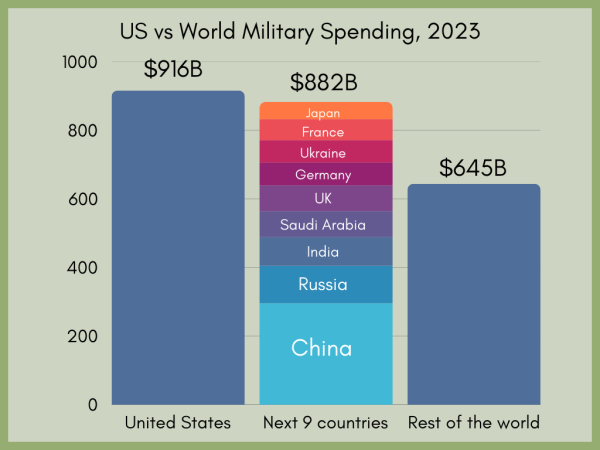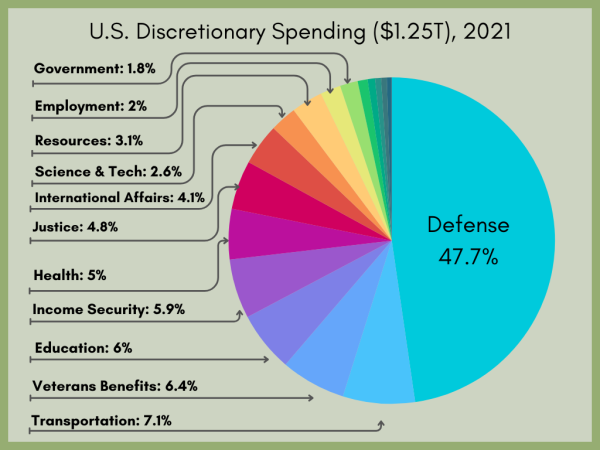$2,400,000,000 a day.
The United States Government spends more money on National Defense than the next 9 countries combined. As of 2022, it’s 45.2 percent of the United State’s discretionary spending (spending that isn’t mandatory). For comparison, the second highest discretionary expenditure is healthcare, at 8.5 percent.
This level of spending stems from the United States’ strategy of global military dominance. While most militaries are solely for the defense of their own country, the United States aims to control the abilities of other nations and to support the United States’ many alliances by maintaining a strong military presence around the world. As a result, the military has developed 750 bases throughout 80 different countries over the years. The large budget covers a range of expenses, primarily operation and maintenance, which keeps bases, fleets and deployments functional. The second greatest expense is the salaries and benefits for over 1.3 million active-duty personnel, nearly 800,000 reserve troops, and countless civilian employees. The budget also accounts for the procurement of weapons and equipment, research and development, as well as a large amount of military aid to other nations.
A significant portion of this spending isn’t entirely necessary. A large amount of money is spent on programs that provide little value for their cost. For example, the F-35 Joint Strike Fighter program. Originally, it was estimated
to cost $233 billion but this cost has risen to over $1.7 trillion due to delays, technical problems and design flaws. This makes it the most expensive weapons system in history. Despite these costs, the program has continued to face constant performance issues and limitations, making it a questionable allocation of resources.

The extensive budget is also due to the monopoly that just a few large weapon contractors hold. Without much competition, these companies can increase the prices of their projects an excessive amount, as they’re the only ones with the technology. In 1991, when there were way more contracting companies, a single shoulder-fired stinger missile cost $25,000. Today, with the major weapons contractor Raytheon as the only seller, the same product costs $400,000. That’s a 16 times increase.
With nearly half of discretionary spending allocated to defense, other critical areas like infrastructure, healthcare and education receive significantly less attention in the federal budget. The United States is too busy interfering with other countries that it forgets to prioritize its people. Just a fraction of the military budget could completely eliminate problems that we have in certain departments. The mismanagement and overfunding of unnecessary programs like the F-35 or overpriced procurement contracts directly take away resources that could improve the lives of millions of Americans.
Advocates for high spending often argue that it is essential for maintaining national

security and ensuring the United States. remains a global leader. They cite threats from nations such as China and Russia and the need to support allies around the world. While this is agreed upon, the level of spending compared to these other nations is disproportional. The U.S. already spends more on defense than many countries combined, most of whom are allies. This spending is much more than would be required for National Defense and instead prioritizes global power over the expense of domestic needs. Funding diplomacy, deterrence and cybersecurity, could achieve the same goals without the extensive budget.
The United States needs to reconsider its spending priorities. The military has so many expenses that the Pentagon has failed for the 7th year in a row to pass a proper financial statement audit, or in other words, they can’t account for 63% of nearly $4 trillion in assets. Therefore the military could easily be spending money on things that it doesn’t actually need. Introducing stricter accountability for expenses, and cutting unnecessary programs, would free up resources to address urgent domestic issues such as infrastructure, healthcare, or education. Reallocating even a fraction of the defense budget could ensure taxpayer dollars are used appropriately to strengthen the nation as a whole, rather than prioritizing the needs of other countries.

